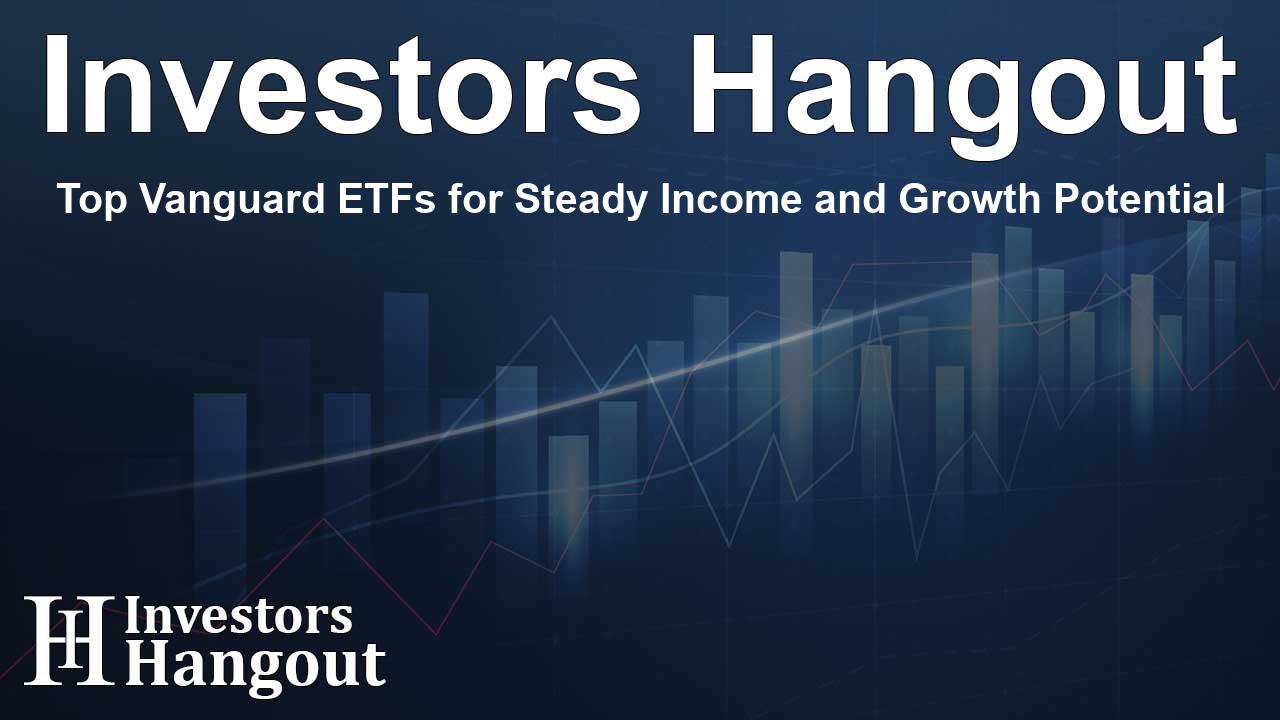Top Vanguard ETFs for Steady Income and Growth Potential

Understanding the Value of ETFs for Your Investment Portfolio
Whether you're just starting out in the world of investing or you're a seasoned pro looking to fine-tune your portfolio, incorporating exchange-traded funds (ETFs) can be a smart decision. Investing in ETFs allows for simplified strategies that can enhance your financial journey without requiring constant monitoring. Routine investments into a chosen ETF can contribute significantly to a robust investment portfolio over time.
The Strength of Vanguard ETFs
Vanguard is synonymous with quality in fund management. Known for delivering impressive returns and diversifying investment options, Vanguard ETFs stand out for their low costs. Their funds often provide dividends that surpass the average yields seen in the market, making them appealing for diverse investor profiles.
Spotlighting Top Vanguard ETFs for Long-Term Investors
Two standout options for investors seeking long-term holdings include the Vanguard Value Index Fund ETF Shares (NYSEMKT: VTV) and the Vanguard High Dividend Yield Index Fund ETF Shares (NYSEMKT: VYM). Let’s explore why these funds can serve well over the years, particularly for those focused on income generation.
1. Vanguard Value Index Fund ETF Shares (VTV)
The Vanguard Value Index ETF features an impressively low expense ratio of just 0.04%, a critical factor for ensuring that management fees do not diminish your returns over time. Boasting a yield of 2.3%, it significantly outstrips the S&P 500 average, which is only 1.3%. This positioning makes it attractive for income-focused investors.
What provides assurance in this fund is its focus on large-cap stocks. Key holdings include some of the industry’s most respected names, such as Berkshire Hathaway, JPMorgan Chase, and UnitedHealth Group. This strategy minimizes risk exposure, as investing in well-established companies tends to deliver relatively stable long-term performance.
Investors can find confidence in the diversity within the VTV, with 341 stocks averaging a price-to-earnings ratio of just under 21. Over the past decade, this ETF has yielded a staggering 171% in total returns, equating to a robust annual growth rate of 10.5%. If this trend continues, investors could see their investment multiply tenfold in approximately 23 years.
2. Vanguard High Dividend Yield Index Fund ETF Shares (VYM)
If you are aiming for higher dividends, the Vanguard High Dividend Yield ETF is worth considering. Offering a dividend yield of 2.8% with a slightly higher expense ratio of 0.06%, it still presents a compelling option for dividend-seeking investors.
This ETF retains a focus on large-cap stocks but highlights those known for substantial yields. Currently, it comprises 550 holdings, showcasing a diverse array of companies. Major players like Johnson & Johnson, Procter & Gamble, and ExxonMobil are leading its portfolio. These companies have established a reputation for not only paying dividends but also consistently increasing them over the years.
Although the VYM has delivered slightly lower returns than the VTV—boasting a solid 160% rise over the last decade—it remains a substantial choice for conservative investors seeking reliable income. Both ETFs offer significant advantages that ensure their relevance in any long-term investment strategy.
Is Now the Right Time to Invest in Vanguard ETFs?
When considering an investment in ETFs such as the Vanguard Value Index Fund ETF or the Vanguard High Dividend Yield ETF, it's essential to analyze your financial goals and the current market environment. Evaluating your risk tolerance and the potential for returns can guide your decision.
Frequently Asked Questions
1. What are ETFs and how do they work?
ETFs, or exchange-traded funds, are investment funds that trade on stock exchanges, similar to stocks. They hold a basket of assets like stocks, bonds, or commodities, offering diversification.
2. Why should I consider investing in Vanguard ETFs?
Vanguard ETFs are known for their low expense ratios, strong historical returns, and reliable dividends, making them an appealing option for various investors.
3. What is the difference between VTV and VYM?
VTV focuses on value stocks with lower price-to-earnings ratios, while VYM targets high-dividend yield stocks, providing income-focused investments.
4. How can I purchase Vanguard ETFs?
You can purchase Vanguard ETFs through most brokerage accounts. Simply create an account, deposit funds, and buy the ETFs as you would with stocks.
5. What is the risk associated with investing in ETFs?
While ETFs generally reduce risk through diversification, they still carry market risks. Investors should always consider their risk tolerance before investing.
About The Author
Contact Riley Hayes privately here. Or send an email with ATTN: Riley Hayes as the subject to contact@investorshangout.com.
About Investors Hangout
Investors Hangout is a leading online stock forum for financial discussion and learning, offering a wide range of free tools and resources. It draws in traders of all levels, who exchange market knowledge, investigate trading tactics, and keep an eye on industry developments in real time. Featuring financial articles, stock message boards, quotes, charts, company profiles, and live news updates. Through cooperative learning and a wealth of informational resources, it helps users from novices creating their first portfolios to experts honing their techniques. Join Investors Hangout today: https://investorshangout.com/
The content of this article is based on factual, publicly available information and does not represent legal, financial, or investment advice. Investors Hangout does not offer financial advice, and the author is not a licensed financial advisor. Consult a qualified advisor before making any financial or investment decisions based on this article. This article should not be considered advice to purchase, sell, or hold any securities or other investments. If any of the material provided here is inaccurate, please contact us for corrections.
